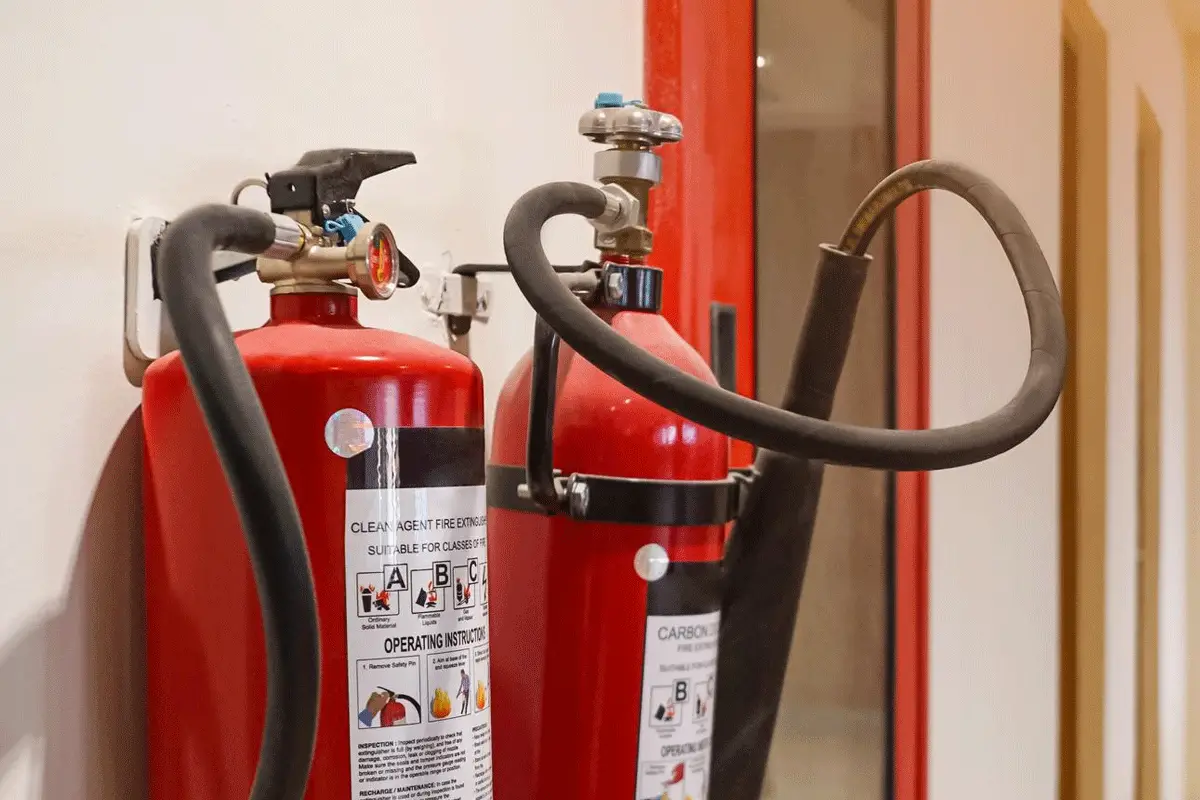Knowing where to get a fire extinguisher recharged is crucial to maintaining fire safety in your home or business.
This guide will help you find local resources to refill a fire extinguisher quickly and conveniently, ensuring your rechargeable fire extinguisher is ready for the next emergency. It also answers common questions you may have about getting your extinguisher refilled, like the cost.
Where To Recharge a Fire Extinguisher
You should recharge your fire extinguisher at a local certified fire equipment service company. Certified companies employ trained technicians who can safely and properly recharge your extinguisher and perform a thorough inspection to ensure it meets safety standards and operates correctly.
Here’s how to find a fire equipment service company to refill your extinguisher:
- Local Search: A quick online search for “fire extinguisher service near me” or “certified fire extinguisher recharge [your city]” will yield results for companies in your area.
- Fire Extinguisher Manufacturer: Many fire extinguisher manufacturers have a locator tool on their website to help you find authorized service providers for their brand.
- Local Fire Department: Some fire departments offer fire extinguisher services or can recommend qualified companies in your area.
Safety First: It’s important to choose a reputable company with certified technicians. Look for affiliations with organizations like the National Fire Protection Association (NFPA) or Underwriters Laboratories (UL).

Frequently Asked Questions
When Should I Recharge My Fire Extinguisher?
Fire extinguishers should be recharged after use and on a regular maintenance schedule to ensure it is properly filled to control a fire.
- After Use: Even if you only partially used your extinguisher, it needs to be refilled. The pressure required for proper operation may be compromised, and the extinguishing agent needs to be replenished for full effectiveness.
- Regular Maintenance: Fire extinguishers need periodic maintenance according to the manufacturer’s instructions and national standards set by the NFPA. This typically involves a pressure check, inspection for damage or corrosion, and a recharge every 12 years for most extinguishers. Some extinguishers may require more frequent recharges depending on the type and use conditions.
Here’s a table showing the approximate service life of different types of fire extinguishers taken from our other guide on the topic, “do fire extinguishers expire“.
| Type of Fire Extinguisher | Approximate Service Life | Notes |
|---|---|---|
| Disposable (Non-Rechargeable) | 12 years | Cannot be refilled after discharge or reaching expiration date. |
| Water | 5 years | Requires annual inspection and pressure testing. |
| Wet Chemical | 5 years | Requires annual inspection and pressure testing. May require more frequent service depending on usage and refill frequency. |
| Carbon Dioxide (CO2) | 10 years | Requires hydrostatic testing every 5 years after the 10th year. |
| Dry Chemical (Standard) | 6 years | Requires annual inspection and service. May require cleaning and refilling after discharge. |
| Dry Chemical (Potassium Bicarbonate) | 12 years | Requires annual inspection and service. May require cleaning and refilling after discharge. |
Note: These are approximate guidelines and may vary depending on the manufacturer, usage, and environmental conditions. Always refer to the manufacturer’s instructions for specific service and maintenance information.
What Is the Cost to Refill a Fire Extinguisher?
As a general estimate, expect to pay between $20 and $50 for a basic recharge service. Additional fees may apply for inspection, repairs, or specialty extinguishers.
The cost to refill a fire extinguisher can vary depending on several factors:
- Type of Extinguisher: Different types of extinguishers (e.g., water, dry chemical, CO2) may have different recharge costs due to the type and amount of extinguishing agent required.
- Size of Extinguisher: Larger extinguishers generally hold more extinguishing agent and require more labor to service, leading to a higher cost.
- Service Company Rates: Prices can vary between service companies. It’s a good idea to get quotes from a few companies before making a decision.
Is It Worth It to Get a Fire Extinguisher Recharged?
Whether it’s worth recharging a fire extinguisher depends on a few factors:
- Age of Extinguisher: Most extinguishers have a lifespan of 10-12 years. Recharging an older extinguisher may not be cost-effective compared to purchasing a new one.
- Condition of Extinguisher: If your extinguisher shows signs of damage, corrosion, or leaks, it may be best to replace it rather than recharge it.
- Cost of Recharge vs. Replacement: Compare the cost of recharging your extinguisher with the price of a new one. Consider the remaining lifespan of your current extinguisher when making this decision.
Here’s a breakdown to help you decide:
- Recharge Makes Sense: If your extinguisher is relatively new (under 10 years old) and in good condition, recharging is likely the most cost-effective option.
- Consider Replacement: For older extinguishers (over 10 years old) or those showing signs of damage, replacing them might be a better choice.
If choose to replace an extinguisher, make sure to read our other guide on how to dispose of fire extinguishers. There are specific locations that take old and expired extinguishers so they can be discarded safely.
Remember, a properly functioning fire extinguisher can be the difference between containing a small fire and experiencing a major disaster. Don’t take the risk with an unreliable extinguisher. When in doubt, consult a qualified fire protection professional for advice.
Wrapping Up on the Places to Get Fire Extinguishers Recharged
A properly maintained fire extinguisher is a fire safety essential. By knowing where to get a fire extinguisher recharged and the factors to consider when refilling locally, you can ensure your extinguisher is ready to protect you and your property.
Don’t wait for a fire emergency – take action today to find a qualified service company and keep your extinguisher in top condition.
